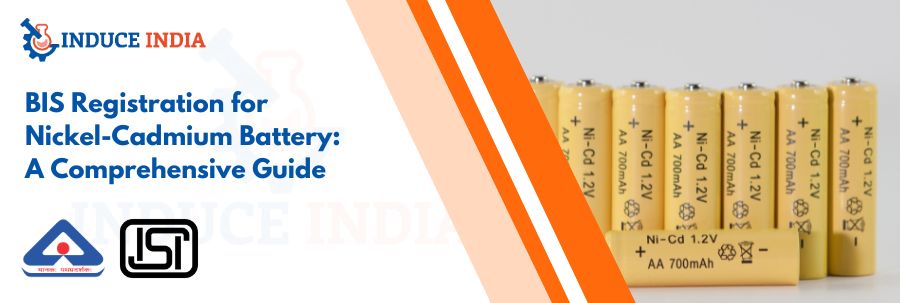For Knowing BIS-Registration-for-Nickel-Cadmium-Battery, you just have to consider the all-important mechanism for portable power in today’s technology-dependent era, the Nickel-Cadmium, or Ni-Cd, batteries are known for endurance, quick discharge rate, and functioning under very low or very high temperature conditions. These characteristics enable their use in applications such as aviation, medical instruments, emergency lights, etc. But, increasingly so with the concern for consumer rights and standardization, the Bureau of Indian Standards (BIS) has made it compulsory to register several battery types, including Nickel-Cadmium batteries.
A Ni-Cd battery manufacturer/importer/distributor in India who fails to obtain the BIS Registration looks at noncompliance; however, they may view it as a step toward public credence and market trust in the product. Induce India discusses the entire procedure, scope, and significance of BIS Registration for Nickel-Cadmium batteries.
What Is BIS Registration?
The Bureau of Indian Standards (BIS) is a national standards body of India under the Ministry of Consumer Affairs, Food & Public Distribution. The BIS makes sure that every product entering the Indian market must conform to certain prescribed standards of quality and safety. BIS Registration under the Compulsory Registration Scheme (CRS) is particularly for electronic and IT products.
BIS Registration for Ni-Cd Batteries assures that the product conforms to safety, operational, and environmental standards, safeguarding the users and the environment.
Reasons to Get BIS Registration for Nickel-Cadmium Batteries
The mandatory requirement for getting Ni-Cd batteries registered stems from some reasons:
- Safety Requirements: Improperly designed batteries carry the risk of fire and chemical hazards.
- Environmental Protection: Since Ni-Cd batteries contain toxic cadmium, environmental handling is of utmost importance.
- Consumer Confidence: The BIS mark on the product assures the customer of the quality and life of the product.
- Market Access: A registered product is eligible for manufacture, import, and sale in India.
By the Electronics and Information Technology Goods (Requirements for Compulsory Registration) Order, the Nickel-Cadmium batteries come under these regulated goods.
Applicable standard for Ni-Cd Batteries
IS 16046 (Part 1): 2018 / IEC 62133-1:2017 prescribes safe conditions for nickel-cadmium batteries as portable sealed secondary cells and batteries containing alkaline or other non-acid electrolytes. This standard includes aspects like:
- Electrical performance testing
- Mechanical and environmental stress tests
- Overcharge and short circuit protection
- Vibration and drop testing
- Fire hazard and toxic exposure risks
Who Needs to Apply?
Any manufacturer of Nickel-Cadmium batteries first needs to obtain BIS registration for selling or distributing within India. The importer or Indian representative of the foreign manufacturer must take on the role of an Authorized Indian Representative (AIR) in the registration process.
Stepwise Procedure for BIS Registration for Nickel-Cadmium Batteries
The steps are listed in an easy-to-follow manner:
-
Step 1: Product Testing
Samples of Ni-Cd batteries have to be tested in a BIS-recognised laboratory before the application for registration is made. The lab evaluates the batteries as per the applicable IS/IEC standards. The manufacturer shall ensure that:
- Samples are duly labelled
- Safety documentation is prepared
- Consistency is maintained in batch production
-
Step 2: Documentation
All documents should be prepared, the basic documents being
- Test Report from BIS-recognized laboratory
- Factory address proof
- The license of the business and the registration certificate of the company
- Authorization letter of the Indian representative (for foreign manufacturers)
- Quality control plan and specification sheet of the product
- Brand/trademark registration details
- Undertaking of conformity
-
Step 3: Online Application
The applicant must furnish the application through the BIS online portal wherein all documents and test results are to be uploaded with some nominal registration fee along with processing charges.
-
Step 4: Scrutiny and Approval
The application, test reports, and documents are scrutinized by the BIS authorities. Provided that all requirements are complied with, the registration with the BIS shall be granted within 20 to 30 working days.
-
Step 5: Grant The Registration:
The Registration is granted. With the granting of registration, a Registration Number is given by BIS, which authorizes the applicant to use the Standard Mark (ISI Mark). The label shall be pasted on each battery and also on the packaging under BIS conditions.
Key Points To Remember
Different Registration shall be required for each brand and also for each place of manufacturing.
- BIS Registration is valid for two years, after which renewal is required.
- Non-compliance may attract penalties in the form of fines and bans on sale or import.
- Product testing shall be done only in the laboratories accredited by BIS.
- In the case of foreign entities, the appointment of a reliable Authorized Indian Representative (AIR) is a must.
How Induce India Can Help
The BIS registration process can be a bit daunting, especially for those applying for the first time or for foreign manufacturers not very familiar with the Indian regulatory environment; this is generally where Induce India can stand tall. As a well-respected compliance and certification consultancy, Induce India provides services for complete BIS registration of Nickel-Cadmium batteries including:
- Product testing coordination
- Documentation management
- Filing and submission of applications
- Liaising with the BIS officers
- Labelling and packaging post-approval
Thus, making the process smoother and quicker, our experts ensure that your application is error-free, complete, and meets all the latest BIS requirements so that your approval is left with minimal time.
General Advantages of BIS Registration for Businesses
Getting your Nickel-Cadmium battery BIS registered offers long-term advantages:
- Brand Credibility: BIS registration stands for quality and safety.
- Legal Compliance: Stay aligned with Indian law and avoid regulatory penalties.
- Market Expansion: A BIS-certified product can enter government tenders, exports, and institutional sales.
- Consumer Confidence: Buyers generally prefer a certified product, particularly for industries or medical use.
- Competitive Edge: BIS registration might act as a distinct selling point in a market crowded with competitors.
Conclusion
The contemporary times are such that matters of safety, quality, and sustainability now take precedence; hence, BIS registration is not enforceable. A mere regulatory requirement is something businesses do out of an inherent sense of corporate responsibility. For manufacturers of Nickel-Cadmium batteries, BIS compliance means safer products, better market outreach, and enhanced customer trust.



